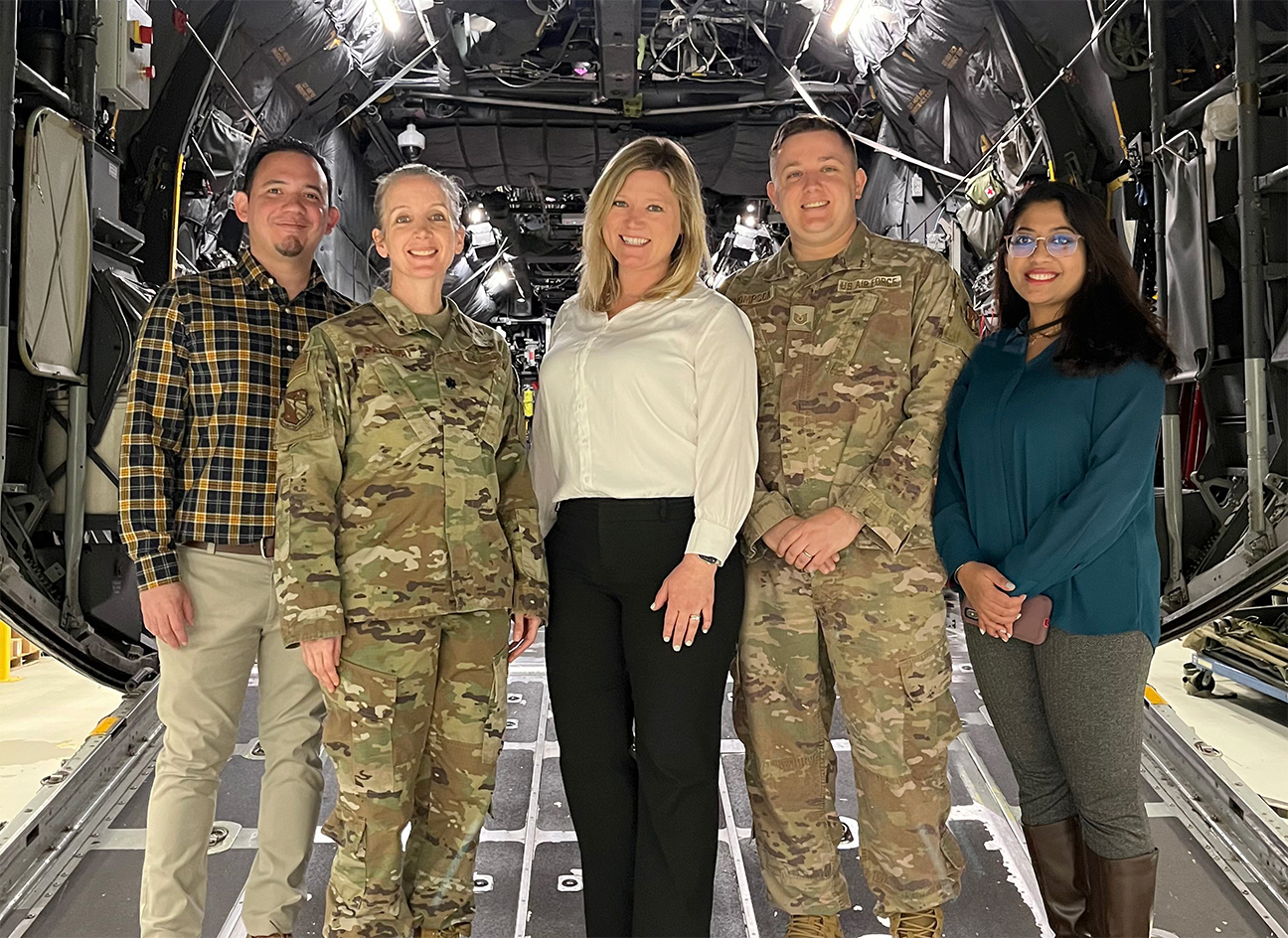WRIGHT-PATTERSON AIR FORCE BASE, Ohio (AFRL) – The office of Aeromedical Operational and Clinical Psychology, or AOCP, offers aerospace and operational clinical consultation for units throughout the Air Force and has done so for over a decade. AOCP is a branch of the U.S. Air Force School of Aerospace Medicine, or USAFSAM, part of the Air Force Research Laboratory’s 711th Human Performance Wing.
“Overall, our mission is to provide evidence-based psychological support to high operational tempo units with the aim of optimizing the well-being and performance of Airmen,” said Dr. Rachael Martinez, acting chief of AOCP. “We accomplish this mission through our psychological testing program, occupational health assessment program, research and education. We offer individual personality assessments and unit psychological health assessments to support the optimization of special duty operators. These groups could include special warfare and remote warfare populations, and many others.”

From left: Aeromedical and Operational Clinical Psychology, or AOCP, branch members Dr. Ivan Colin-Rivera, Lt. Col. Kristen Galloway, Dr. Rachael Martinez, Tech. Sgt. Christopher Thompson and Somtirtha Bag at a team event in the U.S. Air Force School of Aerospace Medicine, or USAFSAM, High Bay at Wright-Patterson Air Force Base, Ohio, March 17, 2023. AOCP consults with units across the Air Force to provide evidence-based psychological support for members. AOCP is a branch of USAFSAM, part of the Air Force Research Laboratory’s 711th Human Performance Wing. USAFSAM’s High Bay has multiple aircraft bodies that allow personnel to train for aeromedical evacuation without taking flight. (U.S. Air Force photo / Jeremy Ward)
AOCP works with units across multiple installations, typically with high-risk and high-demand mission sets and provides data and recommendations to the unit’s leadership and Integrated Operational Support mental health providers. These embedded providers could include clinical psychologists, clinical social workers and mental health technicians. Embedded providers can also use AOCP’s personality assessment data to offer tailored mental health support to Airmen during their training to enhance their chances of completing the training, reducing attrition rates, Martinez said.
“We are trying to provide information that [is] evidence-based and effective,” said Dr. Ivan Colon Rivera, clinical psychologist with AOCP. “People in a position to make decisions can then use that information. A provider or a commander can use quality information to bring about new policy.”
“Our group will go out to the unit and dive in and talk to people at all levels to understand what is working and what could be improved,” Martinez said, regarding the AOCP’s occupational health assessment program. “The reason for that is to customize an assessment, which gives unit leaders a pulse on the organization, including well-validated measures like burnout, psychological distress, unit and leader social support, how much they are sleeping, drinking or exercising and a host of stressors that might be unique to that unit.”
Martinez highlighted an ongoing AOCP research study involving evaluating barriers pilots face when seeking medical or mental healthcare services. Through interviewing pilots from USAF, U.S. commercial and airline organizations, AOCP aims to determine how medical and mental health care services can be tailored to meet pilots’ specific needs and overcome health care-avoidant behaviors.
“Part of the mission is catching it before it gets too bad,” said Lt. Col. Kristin Galloway, clinical psychologist with AOCP. “Because of the stigma and unknowns, people are hesitant to go to mental health, so we want to catch problems and promote intervention before they are forced to go or have a career impact.”
Data from Airmen can be collected anonymously from a group to get more accurate information on what kind of issues they might be encountering. Over the years, AOCP has used data to advocate and get units the support they need, Galloway said.
This method has succeeded with remotely piloted aircraft, or RPA, operators, she said. Pilots of manned aircraft have a cycle where they deploy for a certain amount of time, and when they return, they have time to either train or go on leave.
“RPA operators did not have that,” Galloway said. “It was a grind where they kept going. We wanted to show how that was impacting them, and we were able to advocate to get that policy changed at the RPA enterprise level.”
The AOCP branch also leverages its research and data collection results to produce peer-reviewed publications, provide courses for international conferences, and engage in cross-service collaborations to distribute findings.
“We see a wide-range of publications from our well-seasoned team of military members, civilians and contractors, allowing us to disseminate [the results] more broadly,” Martinez said.
The AOCP team emphasized that their efforts converge around the theme of exploring innovative solutions for enhancing human performance. For more information, please email Martinez at rachael.martinez.1@us.af.mil.
About AFRL
The Air Force Research Laboratory, or AFRL, is the primary scientific research and development center for the Department of the Air Force. AFRL plays an integral role in leading the discovery, development and integration of affordable warfighting technologies for our air, space and cyberspace force. With a workforce of more than 11,500 across nine technology areas and 40 other operations across the globe, AFRL provides a diverse portfolio of science and technology ranging from fundamental to advanced research and technology development. For more information, visit www.afresearchlab.com.

